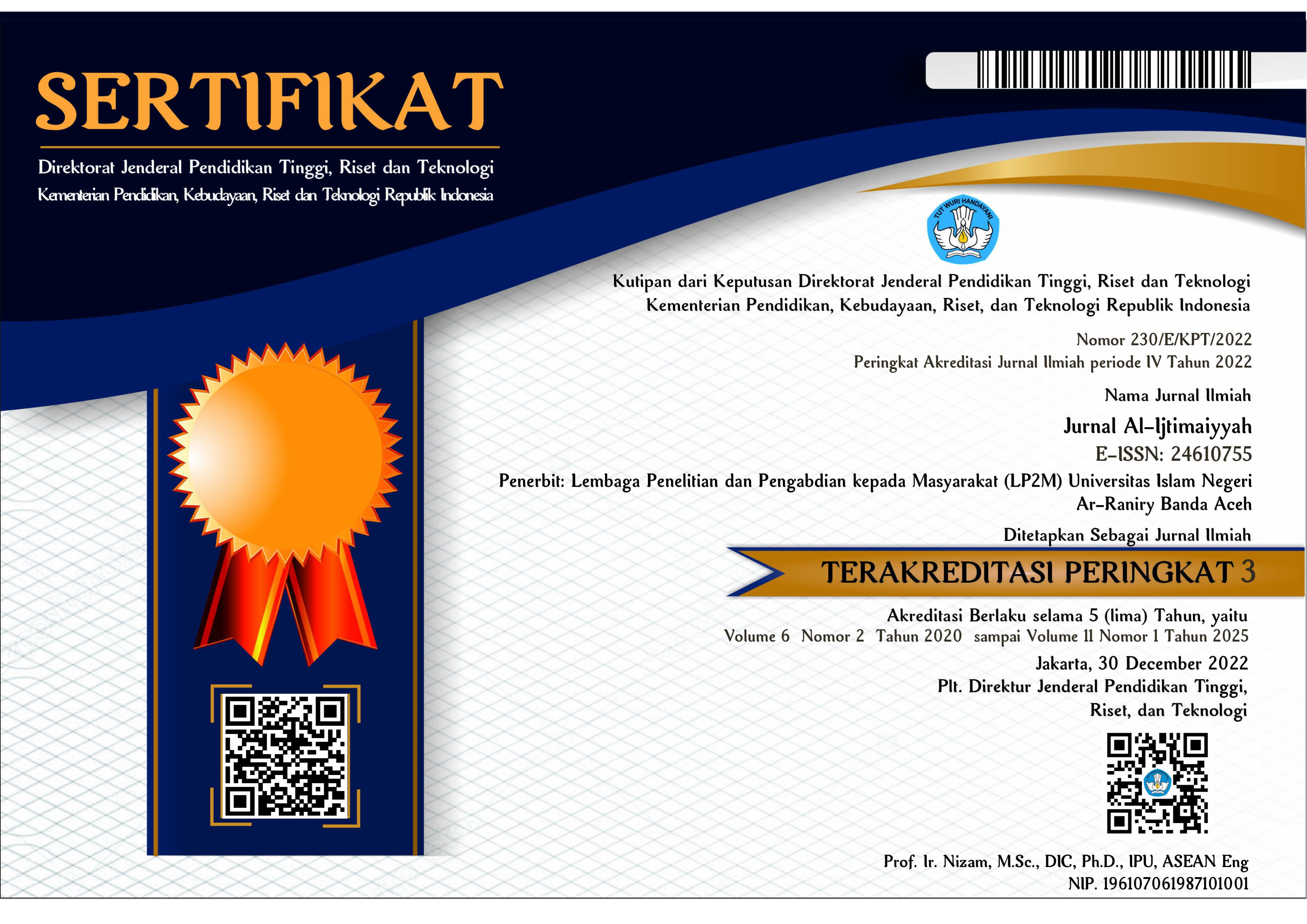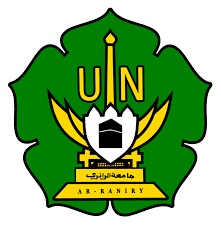PROBLEMATIKA DAKWAH DI NEGERI MINORITAS MUSLIM
DOI:
https://doi.org/10.22373/al-ijtimaiyyah.v5i2.5358Abstract
Allah created human beings with religious instincts, namely the religion of monotheism (Islam). The Koran claims that the religious teachings it introduces are compatible with all humans. Islam as a truth, then Islam must be spread throughout the world and this is the responsibility of every human being on this earth as a caliph. Every Muslim, of course, has an obligation to propagate the da'wah of Islam, even though they experience various kinds of obstacles and obstacles. This certainly applies to Muslims who are in Australia with a Muslim population in Australia currently around one million people. With this quantity of Muslim citizens in Australia, Islamic da'wah is needed to transfer the spread of the values of Islamic da'wah to all Muslims. One way is by establishing Islamic-based educational institutions. At present, the Islamic Council in Australia is intensively building educational facilities based on Islamic education, with the aim of making it easier for them to transfer Islamic knowledge to the Islamic community in Australia. Spreading Islamic da'wah in the current era is full of challenges, especially spreading Islamic da'wah in Muslim minority countries such as Australia. Australia is a country that has a broad geographical position, and upholds the values of freedom, in that case the Australian government guarantees plurality. In the midst of Australia's position that promotes freedom, Islam must be able to place itself in the midst of society and also practice the teachings of Islam in a pluralistic society. Australia has approximately 100 beliefs/religions, with Islam as a minority religion, so the challenge of Islamic da'wah is to keep on doing good communication and living side by side with the differences.
Keywords: Community, Da'wah and Muslim.
Downloads
References
A. Hasjmy. Dustur Dakwah Menurut Al-Qur’an. Jakarta: Bulang Bintang, 1994.
Alwahidi Ilyas. Manajemen Dakwah Kajian Menurut Perspektif Al-Qur’an. Cet. I. Yogyakarta: Pustaka Pelajar, 2001.
Bachtiar Surin. Tafsir Adz-Dzikra. Cet. IV. Juz. 7. Bandung: Angkasa Bandung, 1991.
Bactiar Wardi. Metodologi Penelitian Ilmu Dakwah. Jakarta: Logos Wacana llmu, 1997.
Didin Hafifuddin. Dakwah Aktua. Cet. III. Jakarta: Gema Insani Press, 1998.
Enjang, AS dan Aliyudin. Dasar-Dasar Ilmu Dakwah. Cet. I. Bandung: Widya Padjadjaran, 2009.
Ghazali Darussalam. Dinamika Ilmu Dakwah Islamiyah. Cet. I. Malaysia: Nur Niaga SDN. BHD, 1996.
Hafidz Anshari. Pemahaman dan Pengalaman Dakwah. Surabaya: Al-Ikhlas, 1993.
Hilmi Muhammadiyah. Dakwah dan Globalisasi. Jakarta: ELSA, 2000.
Ibn Katsir. Tafsir Ibn Katsir. Terj. Salim Bahreisy, Juz. IV, Cet. I, Surabaya: Bina Ilmu, 1988.
Ibnu Hilmi Areal. Dakwah Manha. Cet. I. Jakarta: Tahjim Press, 1993.
Jamaluddin Kafie. Psikologi Dakwah. Cet. I. Surabaya: Indah, 1993.
Jum’ah Amin Abdul Ajis. Fiqih Dakwah. Cet. 3. Solo: Era Intermedia, 2000.
M. Ali Kettani. Minoritas Muslim di Dunia Dewasa Ini. Terj. Zarkowi Soejoeti, Jakarta: Raja Grafindo, 2005.
M. Arifin. Psikologi Dakwah suatu Pengantar. Jakarta: Bumi Aksara, 1997.
M. M Amin. Dakwah Islam dan Pesan Moral. Jakarta: Al-Amin Press, 1998.
M. Munir. Metode Dakwah. Ceti. III. Jakarta: Kencana, 2009.
M. Quraisy Shihab. Membumikan Al-Quran. Cet. I. Bandung : Mizan, 1992.
M.A. Azis. Ilmu Dakwah. Ed. I. Cet. I. Jakarta: Kencana, 2004.
Mubasirun. “Persoalan Dilematis Muslim Minoritas dan Solusinya” dalam Jurnal Episteme, Volume. 10, Nomor 1, Juni 2015.
Muhammad Sulthon. Psikologi Komunikasi. Bandung: Remaja Rosda Karya, 2003.
Rafi’udin dan Maman Abdul Jalil. Prinsip dan Strategi Dakwah. Cet. I, Bandung: Pustaka Setia,1997.
Ramli, AM. Dakwah dan Siyasah. Jakarta: Bina Rena Parawira, 2003.
Siti Muriah. Metodologi Dakwah Kontemporer, Yogyakarta: Mitra Pustaka, 2000.
Syeikh Abdul Karim. Dakwah bil Hikmah. Terj. Salem Bahreisj, Jakarta: Pustaka al-Kautsar, 1990.
Warson Munawir. Kamus Al-Munawir. Surabaya: Pustaka Progresif, 1994.
Downloads
Published
Issue
Section
License
Copyright (c) 2019 Muchlis Aziz, Zulfadli, Nurainiah

This work is licensed under a Creative Commons Attribution-ShareAlike 4.0 International License.
Authors who publish in Jurnal Al-Ijtimaiyyah agree to the following terms:
- Authors retain copyright and grant the journal right of first publication with the work simultaneously licensed Attribution-ShareAlike 4.0 International (CC BY-SA 4.0) that allows others to share the work with an acknowledgment of the work's authorship and initial publication in this journal.
- Authors are able to enter into separate, additional contractual arrangements for the non-exclusive distribution of the journal's published version of the work (e.g., post it to an institutional repository or publish it in a book), with an acknowledgment of its initial publication in this journal.
- Authors are permitted and encouraged to post their work online (e.g., in institutional repositories or on their website) prior to and during the submission process, as it can lead to productive exchanges, as well as earlier and greater citation of published work. (See The Effect of Open Acces)










